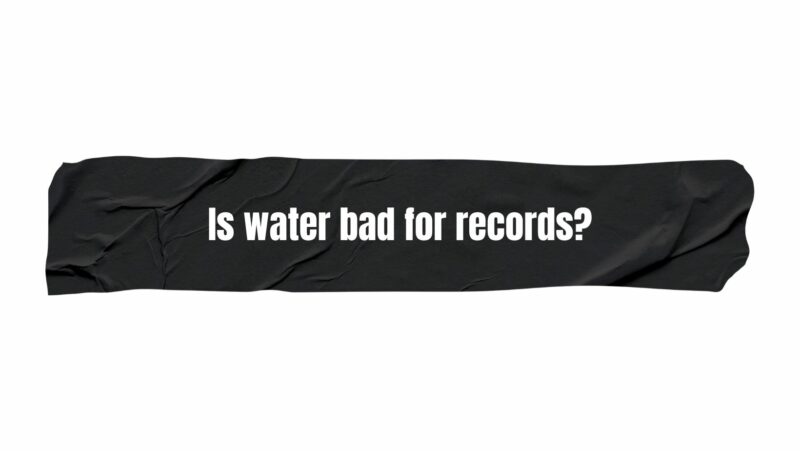Vinyl records are a physical medium for storing audio recordings. They are made of a polyvinyl chloride (PVC) disc with a spiral groove cut into it. The groove contains the analog signal that is converted into sound waves by the needle of a record player.
Is water bad for vinyl records?
Yes, water can be bad for vinyl records. Water can seep into the record grooves, causing warping, mold growth, label deterioration, and other detrimental effects.
How does water damage vinyl records?
When water gets on a vinyl record, it can seep into the record grooves and swell the PVC material. This can cause the record to warp, which can make it unplayable. Water can also promote the growth of mold and mildew, which can further damage the record. The label in the center of the record can also be damaged by water, making it difficult to identify the record.
What are the signs of water damage to vinyl records?
If your vinyl records have been exposed to water, there are a few signs that you can look for:
- Warping: The record may be curved or bowed.
- Mold or mildew: You may see mold or mildew growing on the record or the label.
- Label deterioration: The label may be peeling or discolored.
- Noise: When you play the record, you may hear crackling or popping noises.
How to prevent water damage to vinyl records
There are a few things you can do to prevent water damage to your vinyl records:
- Store your records in a cool, dry place. The ideal temperature for storing vinyl records is between 65 and 70 degrees Fahrenheit.
- Use protective sleeves for your records. Sleeves will help to keep dust and dirt off of your records, which can also help to prevent water damage.
- Avoid getting your records wet. If you do get your records wet, dry them immediately.
How to clean water-damaged vinyl records
If your vinyl records have been exposed to water, you can try to clean them to remove any dirt or debris. However, it is important to be careful not to damage the records further.
To clean water-damaged vinyl records, you will need:
- Distilled water
- A cleaning solution
- A soft, clean cloth
- A hair dryer
Instructions:
- Inspect the records for damage. If the records are severely warped or damaged, it may be best to take them to a professional for cleaning.
- Remove any dirt or debris from the records with a soft, clean cloth.
- Mix the distilled water and cleaning solution according to the instructions on the cleaning solution bottle.
- Dampen the cloth with the cleaning solution.
- Wipe the records gently with the cloth.
- Dry the records thoroughly with a hair dryer.
Conclusion
Vinyl records are a delicate medium that can be easily damaged by water. By following these tips, you can help to prevent water damage to your vinyl records and keep them in good condition for years to come.
Here are some additional tips for caring for your vinyl records:
- Do not clean your records with harsh chemicals or abrasive materials.
- Do not expose your records to direct sunlight or heat.
- Handle your records with care.
- Keep your records in a dust-free environment.


